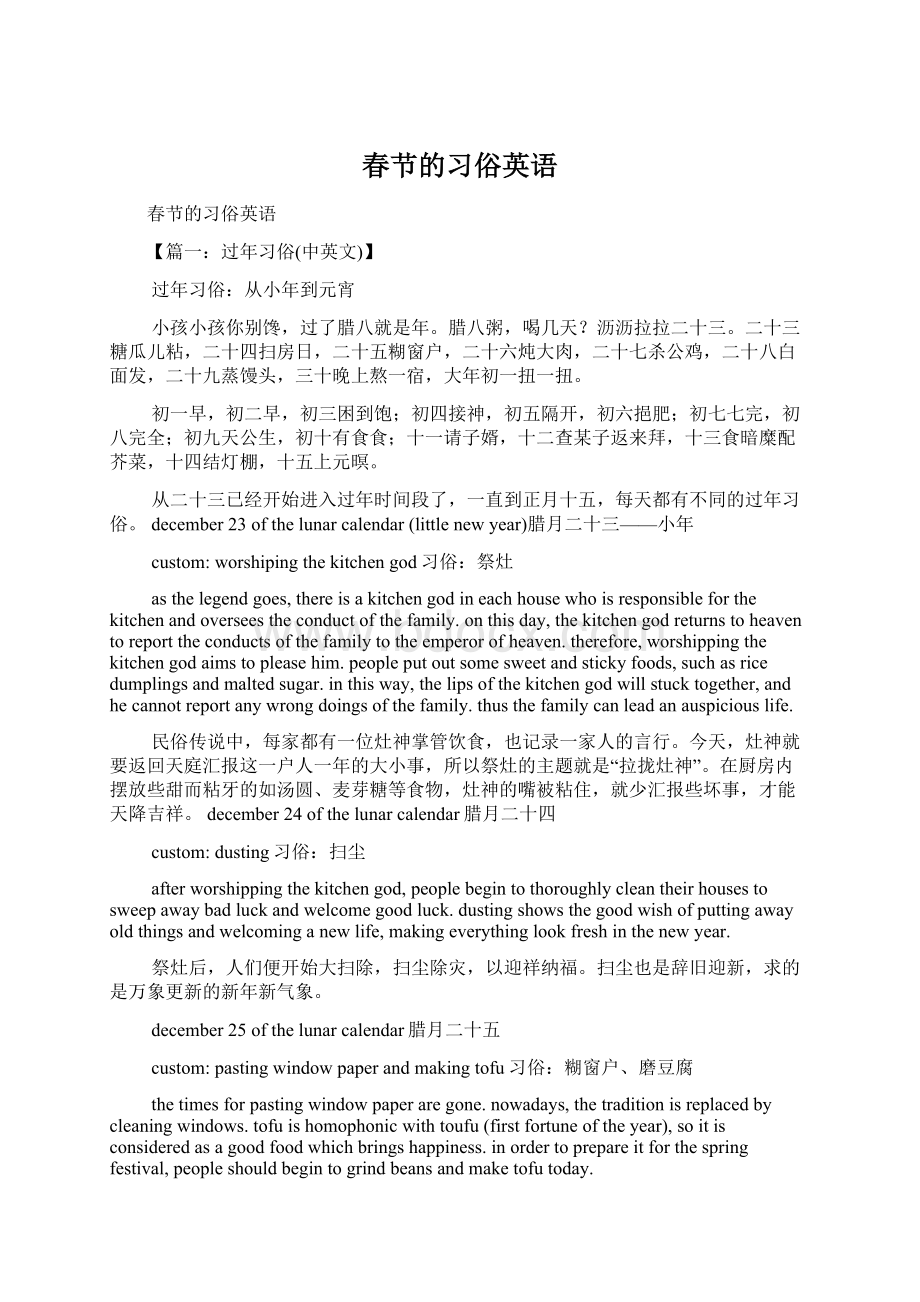春节的习俗英语.docx
《春节的习俗英语.docx》由会员分享,可在线阅读,更多相关《春节的习俗英语.docx(14页珍藏版)》请在冰豆网上搜索。

春节的习俗英语
春节的习俗英语
【篇一:
过年习俗(中英文)】
过年习俗:
从小年到元宵
小孩小孩你别馋,过了腊八就是年。
腊八粥,喝几天?
沥沥拉拉二十三。
二十三糖瓜儿粘,二十四扫房日,二十五糊窗户,二十六炖大肉,二十七杀公鸡,二十八白面发,二十九蒸馒头,三十晚上熬一宿,大年初一扭一扭。
初一早,初二早,初三困到饱;初四接神,初五隔开,初六挹肥;初七七完,初八完全;初九天公生,初十有食食;十一请子婿,十二查某子返来拜,十三食暗糜配芥菜,十四结灯棚,十五上元暝。
从二十三已经开始进入过年时间段了,一直到正月十五,每天都有不同的过年习俗。
december23ofthelunarcalendar(littlenewyear)腊月二十三——小年
custom:
worshipingthekitchengod习俗:
祭灶
asthelegendgoes,thereisakitchengodineachhousewhoisresponsibleforthekitchenandoverseestheconductofthefamily.onthisday,thekitchengodreturnstoheaventoreporttheconductsofthefamilytotheemperorofheaven.therefore,worshippingthekitchengodaimstopleasehim.peopleputoutsomesweetandstickyfoods,suchasricedumplingsandmaltedsugar.inthisway,thelipsofthekitchengodwillstucktogether,andhecannotreportanywrongdoingsofthefamily.thusthefamilycanleadanauspiciouslife.
民俗传说中,每家都有一位灶神掌管饮食,也记录一家人的言行。
今天,灶神就要返回天庭汇报这一户人一年的大小事,所以祭灶的主题就是“拉拢灶神”。
在厨房内摆放些甜而粘牙的如汤圆、麦芽糖等食物,灶神的嘴被粘住,就少汇报些坏事,才能天降吉祥。
december24ofthelunarcalendar腊月二十四
custom:
dusting习俗:
扫尘
afterworshippingthekitchengod,peoplebegintothoroughlycleantheirhousestosweepawaybadluckandwelcomegoodluck.dustingshowsthegoodwishofputtingawayoldthingsandwelcominganewlife,makingeverythinglookfreshinthenewyear.
祭灶后,人们便开始大扫除,扫尘除灾,以迎祥纳福。
扫尘也是辞旧迎新,求的是万象更新的新年新气象。
december25ofthelunarcalendar腊月二十五
custom:
pastingwindowpaperandmakingtofu习俗:
糊窗户、磨豆腐
thetimesforpastingwindowpaperaregone.nowadays,thetraditionisreplacedbycleaningwindows.tofuishomophonicwithtoufu(firstfortuneoftheyear),soitisconsideredasagoodfoodwhichbringshappiness.inordertoprepareitforthespringfestival,peopleshouldbegintogrindbeansandmaketofutoday.
纸糊窗户的时代已经过去,所以如今这习俗已经被擦玻璃取代。
而豆腐音同“头福”,被视为能够为新年带来福气的好食材,要为过年做准备,今天就要开始磨豆自制豆腐了。
december26ofthelunarcalendar腊月二十六
custom:
preparationofmeatandshoppingforthespringfestival习俗:
割年肉、置年货
whentherewasinsufficientfoodinthepast,themajorityofordinarypeoplecouldenjoyacomparativelylavishfeastonlyduringthespringfestivalcanbestartedontheday.besidesmeatandfish,peoplealsopurchasecigarettes,wines,fruits,giftsandfestiveornaments.
在物质不丰富的年代,大多寻常人家要到年节期间才能吃得丰富一些。
割年肉主要指准备春节的肉食,实际上也代表各种年货可以从这一天开始置办,除了鱼、肉,还有烟酒瓜果以及礼品、装饰等。
december27ofthelunarcalendar腊月二十七
custom:
batingandgoingtothemarket习俗:
洗浴、赶集
accordingtothetraditionalfolkcustomsofthehanethnicgroup,peopleshouldtakeabathanddotheirwashingstogetridofbadluckfromthepastyearandwelcomethenewyear.besidesthepurposeofpurchasinggoods,peoplealsogoshoppingtoenjoytheexcitingatmosphereofthespringfestivalinadvance.
汉族传统民俗中,在这天要洗澡、洗衣,以除去一年的晦气,准备迎接来年的新春。
赶集,除了担负置办年货的任务,也能提前感受过年的热闹气息。
december28ofthelunarcalendar腊月二十八
custom:
leavingdoughandpastingspringcouplets习俗:
发面、贴春联
besidesmeatandsidedishes,peoplealsopreparecookedwheatenfoodforthespringfestival.peopleinnorthchinamainlyeatnoodles.theyleavendough,steambunsorcooknoodlesduringthespringfestival.today,peoplealsopastespringcoupletsandpictures.withconcisetextsandfestivepatterns,peopleshowtheirwelcomeforthespringfestival.inaddition,theseactivitiesindicatethatthespringfestivalbegins.
准备了肉食配菜后,也要准备主食。
北方以面为主食,发好面,可以在春节期间蒸馒头或者做面条等食物。
这一天也是将春联、年画贴出来的日子。
以简洁的文字和喜庆的图案迎接春节、抒发愿望,也意味着春节正式拉开帷幕。
december29ofthelunarcalendar腊月二十九——小除夕
custom:
payingtributetoancestors习俗:
祭祖
preparationforthespringfestivalshouldbecompletedtoday,thedaybeforenewyearseve.worshippingancestorsisalsoamajoreventonthisday,bywhichpeopleexpresstheirgratitudeandyearningfortheirancestorsduringtheimportantfestival.
过年的准备工作将在除夕前一天的今天全部完成。
除此之外,祭祖也是这天的重要活动,以在春节这最重要的节日表达感恩与思念。
december30oflunarcalendar,alsocalledchuxi(newyearseve),isthelastdayoftheyearaccordingtolunarcalendar.itmeanssayinggoodbyetothelastyearandwelcomingthenewyear.chuxiistochinesepeoplewhatchristmaseveistowesterners.anditsalsotheclimaxofthewholespringfestival.therearemanycustomsineveryperiodoftimeonthisspecialdayandthosecustomshavebeenwellobservedforthousandsofyears.
大年三十,中国农历的最后一天,又称“除夕”——告别旧日,迎来新年。
这一天对每一个中国人来说意义非凡,如同平安夜在圣诞假期中的重要地位一般,整个春节的高潮也在这一天到达顶峰。
这一天中,每一个时间段都有约定俗成的讲究,几千年来,延续至今。
7:
00-11:
30preparingforthereuniondinner团年饭准备
inthemorning,everyfamilybeginskillingchickenandfishesaswellascuttingmeatandvegetablestoprepareforthereuniondinner.
清晨开始,各家各户就忙着宰鸡、剖鱼、剁肉、切菜?
?
为团年大餐做着最后的筹备工作。
11:
30-11:
50prayingtoancestors拜敬祖先
althoughdifferentregionshavedifferentcustom,manywillpraytotheirancestorsbeforethedinneronthisday.allthefamilymembershosedbytheirpatriarchofferincenseandkowtowto
thememorialtabletsorthepicturesoftheirancestors,thentheyburnpapermoneyandprayonebyone.theyalsopresentthemaindishesofthereuniondinnerincludingporkasofferingstotheirrespecttotheancestors.
虽各地都有不同的习俗,但大多会在今日正式的宴席前拜敬祖先。
全家人在家长的主持下,对祖先的牌位、人像烧香叩拜,并逐一烧纸祈福。
也会提前将宴席上的主菜如猪肉等作为贡品呈放,以示对先辈的尊敬。
12:
00-18:
00enjoyingthereuniondinnergivingluckymoney团年饭开席、发压岁钱
thetwowonderfulmealsatthisdayarecalledreuniondinners,amongwhichthenewyearsevedinnerismuchmoreimportant.
除夕日的两顿大餐称为“团年饭”,其中尤以晚餐“年夜饭”为重头戏。
thereareabundantdishesforthenewyearsevedinner.thedishesareofawidevarietyandtheyallimplythemeaningofgoodluck.foreexample,fishsharesasimilarpronunciationwithyuwhichstandsforabundance;beetrootsoundslikecaitouthatmeansonecanhavegoodluckinthenewyear.besides,therearechicken,duck,fish,porkandbeefinthedinner,whichsymbolizearichnewyear.whileissichuan,everyfamilyhashome-madesausageandcuredmeataswellaschineseliquor.
年夜饭的餐桌上总是丰盛异常,菜色虽然五花八门,但宗旨都要有开福纳吉的好寓意。
如“鱼”和“余”谐音,象征“年年有余”;“菜头”与“菜头”谐音,象征来年有好彩头,鸡鸭鱼猪牛肉都备齐,则表明来年丰裕。
在四川地区,还少不了自家酿制的香肠、腊肉,当然,还有白酒。
duringdinnertime,chinesepeopledonotjusteatanddrinkalthoughthefoodanddrinksareverydelicious.theyalsosaysomebestwishessuchasiwishyougoodhealthandalonglife,mayallgowellwithyou,etc.totheelders,andthenhopetogetluckymoneyfromthosehappyelders.itissaidthattheluckymoneycandriveoutevilspiritsbecauseitsharesthesamepronunciationwithsuiinchinese(meaningevilspirits),thuschildrenwhogetluckymoneywillbesafeinthenewyear.surely,receivingluckymoneyisthefavoriteeventofeverychildduringthespringfestival.
热闹的年夜饭进行到中段,酒菜正酣,可别只顾着吃喝,晚辈们此时只须给长辈献上几句如“健康长寿”、“万事如意”的吉祥话,就只等长辈乐呵呵发送压岁钱了。
相传压岁钱可以压住邪祟,因为“岁”与“祟”谐音,得到压岁钱的小辈就可以平平安安度过一岁。
当然,这也是小辈们无可争议最喜欢的过年“节目”。
20:
00watchingspringfestivalgala看春节联欢晚会
shownduringthechinesenewyearseve,thespringfestivalgalaisalargevarietyshowproducedbychinacentraltelevision.althoughithasbeencriticizedformanytimesbecauseofitsoutdatedcontentsandforms,thegalaisstillanimportantprogramforchinesefamiliestosittogether,enjoyfamilyloveandsharehappinessinthespringfestival.
春节联欢晚会,是中国中央电视台在每年除夕晚上举办的大型文艺晚会。
如今虽然饱受形式内容老套的诟病,但依然是大年夜一大家子围坐在沙发上,感受亲情、分享喜乐的重要过年项目。
23:
00-24:
00offeringincenseandpraying上香祈福
nearthemidnight,thesoundofthegalahasbeenalreadycoveredbythethunderoffireworksoutside.atthemoment,allthefamilymembersgototollnewyearbellsandofferincenseat24:
00inanearbytemple.everyyear,largetemplesindifferentregionsholdgrandspringritualforblessingsonnewyearseve.peopleputtheirpalmstogetherdevoutlyandprayfora
wonderfulnewyearatthecrowdedtemple.suchactivitywilllasttotheendofthefirstdayoftheyear.
临近午夜,电视机里的声音早已被窗外震耳的炮竹声盖过,人们便扶老携幼全家出动,到附近的寺庙撞新年钟、上子时(零点)香。
每年除夕夜,各地大型的寺庙都将举行盛大的新春祈福法会,在人头窜动的寺庙中,人们虔诚地双手合十,祈愿来年的美好。
这样的活动也将跨过零点,持续大年初一整日。
custom:
new-yearvisitsandcollectingfortune习俗:
拜年聚财
visitingrelativesisstillconsideredamajoreventonthefirstdayofthefirstlunarmonth.also,itisthebirthdayofbroom,soitistabootousebroomortakeouttrash,otherwise,youmightsweepawaygoodfortunesandsufferfinanciallosses.
延续自大年夜,拜年依然是大年初一的重要活动。
另外由于这天是“扫把星”的生日,正月初一要注意不能动用扫帚,也不要丢垃圾,否则就会扫走运气、破财。
january2ofthelunarcalendar正月初二
custom:
marrieddaughtersreturntoparentshome习俗:
回娘家
marrieddaughtersvisittheirparentswiththeirhusbandsonthisday,sothisdayisalsocalledwelcomeson-in-lawday.thecouplemustbringsomegiftsandredenvelopesalongwiththem,andgivethemtochildrenfromthewifessideofthefamily.theyhavetoreturnhusbandsfamilybeforedinner.
出嫁的女儿回娘家,要与丈夫同行,所以也称“迎婿日”。
这一天,回娘家的女儿必须携带一些礼品和红包,分给娘家的小孩,并且在娘家吃午饭,但要在晚饭前赶回婆家。
january3ofthelunarcalendar正月初三
custom:
stayingathome习俗:
忌出门
accordingtocustom,peopleshouldnotpayvisitstoothersonthethirddayofthefirstlunarmonthasitisverylikelytoquarrelwithothersonthisday.however,thishasalreadybecomeobsolete.itisarareopportunityforpeopletogetreunitedduringthespringfestival,solessandlesspeoplefollowthistradition.
按照习俗,人们在初三通常不会外出拜年,传说这天容易与人发生争执。
不过这个习俗早已过时,现在人们难得春节团聚,对此已经淡化许多。
january4ofthelunarcalendar正月初四
custom:
worshipingthegodofwealth习俗:
祭财神
itisthedayforworshippingthegodofwealth.inthepast,ifanemployeewasnotinvitedtoworshipthegodofwealthwiththeboss,he/shehadtoresignaccordingtotheunwrittenrule.今天是及财神的日子,过去,老板想将某人“炒鱿鱼”,这天就不请他来拜神,对方也就心知肚明,自己收拾走人。
january5ofthelunarcalendar正月初五
custom:
breakingfive习俗:
破五
itisthedaytodriveawayfiveghostsofpoverty(povertyinintelligence,knowledge,literacy,fate,andfriendship).peoplelightfirecrackersinthemorningforminsidetooutsideoftheir
housestoscareawayalltheghosts.
俗称破五,要